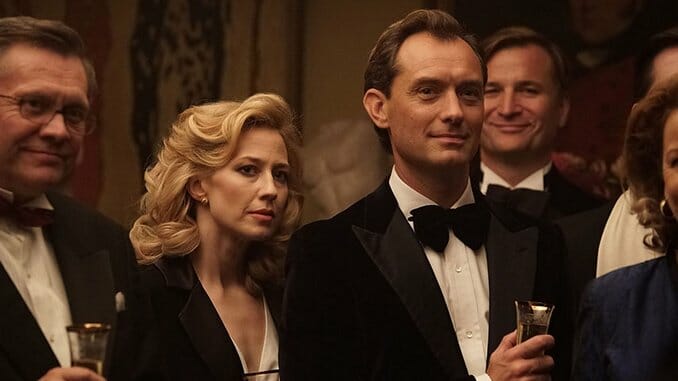
If nine years had to pass for Sean Durkin to make a follow-up to his stunning 2011 debut, Martha Marcy May Marlene, then so be it. Maybe filmmakers shouldn’t be expected to knock out a new one every other calendar year; maybe taking time to let their projects simmer and stew is a virtue. Not that Durkin hasn’t kept busy in the last near-decade, between 2014’s miniseries Southcliffe and the odd music video shoot, but in a Deadline interview from January he cites one project after another failing to come to fruition, with his sophomore film, The Nest, rising in the back of his head like so much sourdough.
Like Martha Marcy May Marlene, The Nest is about family turmoil. Unlike Martha Marcy May Marlene, it isn’t about cults, at least not directly: The Manson vibes of that film are replaced by “greed is good” vibes in The Nest, a movie about the uniquely American dream of wealth at any cost and every risk. Durkin sketches reckless individualism with shades of U.S. exceptionalism, presenting the dual ideas that money is an end unto itself rather than a means and the almighty dollar is a deity to worship for worship’s sake. It’s a cutting irony that the character who embodies this aesthetic is a British expat, Rory (Jude Law), who lives in New York with his American wife, Alison (Carrie Coon), their son Benjamin (Charlie Shotwell), and Alison’s daughter from another marriage, Sam (Oona Roche).
Rory is an investment broker, emphasis on the “bro.” Alison trains horses and their riders. Between the two, she’s the contented one, happy with her career and with her personal definition of autonomy. Rory’s unsatisfied. He wants more despite having enough: a beautiful home, a beautiful family, a backyard pitch for playing soccer. Rory’s wanting is a disease contracted on American soil. He pushes Alison to move back to England, citing opportunities with his old employer, Arthur (Michael Culkin), and promising Alison the chance to be her own boss, to train her own horses. It’s an enticing fantasy. He even sweetens the pot with a grand but disused manse in Surrey, the rent paid for a year, and the first horse in Alison’s future stable purchased. Coon acts with a pointed silence occasionally interrupted when Alison speaks her mind with blunt pride, her most defining American quality, but she surrenders to Rory’s many material gestures. This, she seems to say, is fine, until she loses patience and begins pulling his card in front of waiters, peers and potential clients. Coon’s performance masterfully demonstrates her talent for communicating razor-sharp disdain.
Money and the never-ending pursuit of even more money is no foundation to rest a home on, and the family’s new world begins to crumble almost immediately after they settle into it. The Nest stages that slow decay with equally slow filmmaking: Durkin uses static shots and slow zooms, contrasting steadier camera techniques applied by his cinematographer, Mátyás Erdély, against his characters’ restlessness. Even when the picture holds still, there remains a sensation of furious, frantic motion, which Durkin marries to a muted palette and oppressive lighting to form a suffocating dramatic atmosphere. As played by Law, Rory buzzes under his own skin while relentlessly climbing the social ladder two rungs at a time. He isn’t even earning money. He’s earning the potential for making money, a notion Alison either finds infuriating or pathetic depending on the scene.
Frankly, it’s both, and occasionally it’s sympathetic. In The Nest, money means status and power, two things Rory desires very much for no other reason than to possess them, but it’s also a balm for old wounds. Rory didn’t grow up well off. His acquisitive nature derives from a need to escape his upbringing. But Durkin understands money as a living organism capable of sustaining a man and betraying him at the same time. What Rory learns from his time in America is that money is everything. What he doesn’t learn is that money’s a fickle creature and while anyone can make it, keeping it is the harder part. Durkin avoids communicating the moldy cliché aloud, but money really can’t buy happiness. It tends to invite misery more often, in fact: Benjamin struggles to adjust to his new school, Sam turns into an emotional terrorist and starts hanging out with the Wrong Crowd and nothing, no matter how hard she tries, works in Alison’s favor, even the lavish dinners Rory whisks her off to serve as arm candy while he bullshits about the theater in front of simpering rich folks.
Coon’s face actively curdles in real time during one such sequence as she listens to Arthur plant a loud, wet smacker on Rory’s arse before an assembled coterie of snobs and socialites. If eyes are windows to the soul, Alison’s is a vomitorium. Here, she realizes what Rory’s gotten her into. Here, her regrets take root. Once their marriage begins disintegrating, everything else follows, right down to that first horse and the barn left unfinished on their property. The Nest concentrates itself not on cult of personality but on the America cult of monetary gain, and between the two, the latter is arguably more frightening. When Durkin makes movies, he makes movies about the things that scare him, and the greed bubbling at The Nest’s core should scare everyone.
Director: Sean Durkin
Writer: Sean Durkin
Starring: Carrie Coon, Jude Law, Charlie Shotwell, Oona Roche, Michael Culkin, Adeel Akhtar
Release Date: September 18, 2020
Bostonian culture journalist Andy Crump covers the movies, beer, music, and being a dad for way too many outlets, perhaps even yours. He has contributed to Paste since 2013. You can follow him on Twitter and find his collected work at his personal blog. He’s composed of roughly 65% craft beer.